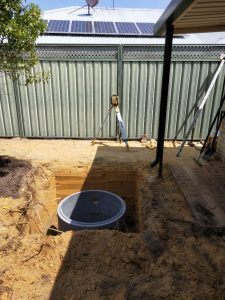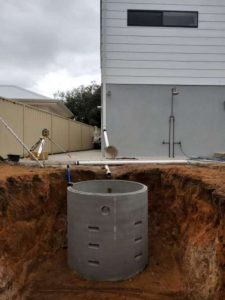A soakwell is one of the essential structures in any new or existing property, whether it’s a residential or commercial building. Also called a dry well, a soakwell acts as an underground tank that temporarily holds stormwater or water runoff and then dissipates the water to the surrounding ground soil to prevent flooding and erosion.
Soakwell installation in your property can help prevent many problems including soil erosion, subsidence of the structure, and rising dampness on floors and walls. If your home is made from wood, having a soakwell underground can guide water away from your property, which can help avoid rotting wood, mould growth, and termite infestation. Besides the benefits it’s also required to keep water that falls on your property to stay on your property, making soakwells the go to solution.
What are the Various Soakwell Materials?
Soakwells come in different types and each of them has its advantages. Below are the common materials used in building soakwells:
Concrete Soakwells
Concrete soakwells are by far the most durable option compared to other soakwell materials. If installed properly, a well-made concrete soakwell can last for many years up to 30 years in most cases. Construction of concrete soakwells can be expensive because it requires expertise and the use of heavy machinery, but the long-term benefits outweigh the high upfront costs.
Soakwells made from concrete can withstand high water pressure and expanding soil. They are also efficient in containing large amounts of water whilst slowly dispersing it to the encircling soil. Concrete soakwells are suitable in many soil types, especially to less permeable soil like clay or limestone. They are also ideal in high-traffic areas as they can bear the weight of passing vehicles above ground.
If your property is near a forest or reserve, concrete soakwell installation is a good option because it has a large opening, making it easy to remove fallen leaves or other waste materials to avoid clogging. Because of their hard-wearing properties, concrete soakwells require minimal maintenance, allowing you to save on upkeep or replacement costs.
Polypropylene Soakwells
Polypropylene soakwells are more lightweight compared to concrete soakwells. Polypropylene material is also durable and has a high load-bearing capacity, which makes it suitable for areas with high traffic. This type of soakwell is also an eco-friendly option as it is also recyclable after its service life. Some polypropylene soakwells come in a modular design, which allows you to connect them easily, either vertically or horizontally, depending on the size of the project site.
PVC Soakwells
PVC or Polyvinyl chloride is another material used in constructing soakwells. Like polypropylene soakwells, PVC soakwells are lightweight, which makes them easier to transport and install than concrete soakwells. Because of this feature, PVC soakwells are ideal in tight spaces and hard-to-access areas.
Dobson Excavations Offer Concrete Soakwell Installation Service
Protect your property from foundation damage and other structural problems caused by long-term water retention and soil erosion. Let our team of soakwell installation experts handle your build. Our personnel are equipped with the tools and expertise to complete any project, no matter how big or small. For more information about our services or to request a quote, contact us here.
Posted on https://www.dobsonexcavations.com.au/various-soakwell-materials/


